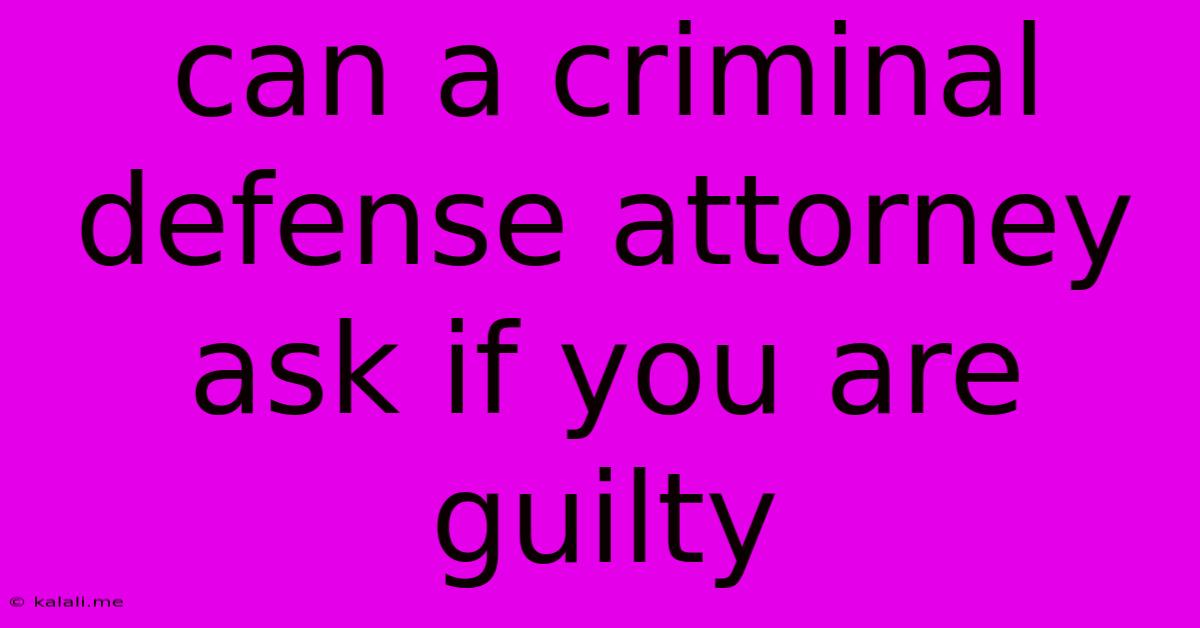Can A Criminal Defense Attorney Ask If You Are Guilty
Kalali
May 24, 2025 · 3 min read

Table of Contents
Can a Criminal Defense Attorney Ask If You Are Guilty? The Complexities of Attorney-Client Privilege
The question of whether a criminal defense attorney can ask their client if they are guilty is a common one, steeped in the complexities of attorney-client privilege and effective legal representation. The short answer is: yes, they can, but the context and implications are far more nuanced than a simple yes or no.
This article will explore the reasons why this seemingly straightforward question holds significant weight in the criminal justice system, the ethical considerations for attorneys, and the importance of open communication between client and lawyer.
Understanding Attorney-Client Privilege
At the heart of this matter lies attorney-client privilege, a fundamental principle in law. This privilege protects confidential communications between a lawyer and their client from disclosure to third parties. This means your lawyer cannot reveal your confession of guilt to the prosecution without your permission. This confidentiality is crucial for building trust and facilitating an effective defense. It allows clients to be completely open and honest with their attorneys, even if that includes admitting guilt.
Why a Defense Attorney Needs to Know the Truth (or Your Version of It)
While the attorney-client privilege protects your communications, it doesn't require your lawyer to remain ignorant. In fact, a competent defense attorney needs a thorough understanding of the facts, even if those facts include your admission of guilt. This is essential for several reasons:
- Developing a Strong Defense Strategy: Knowing the truth – or at least your perspective on the events – allows the attorney to craft the most effective defense possible. Even if you are guilty, there might be mitigating circumstances, procedural errors, or weaknesses in the prosecution's case that can be exploited. A plea bargain may be a viable option.
- Assessing the Strength of the Prosecution's Case: Understanding your actions allows the attorney to accurately assess the prosecution's evidence and anticipate their strategy. This allows for better preparation and negotiation.
- Advising on Plea Bargains: If a plea bargain is a possibility, your attorney needs to know your perspective to negotiate effectively on your behalf.
- Identifying Potential Defenses: Even with a confession of guilt, there may still be legal defenses available, such as self-defense, duress, or insanity. Your attorney needs all the information to explore these possibilities.
- Protecting Your Rights: Regardless of guilt or innocence, your attorney is obligated to protect your constitutional rights. This requires a complete understanding of the facts and your involvement.
The Ethical Considerations for Attorneys
While an attorney can ask about guilt, they are bound by ethical obligations:
- Maintaining Confidentiality: The information shared remains confidential and protected by attorney-client privilege.
- Offering Impartial Advice: The attorney must provide objective legal counsel, regardless of their personal opinion on your guilt or innocence.
- Acting in the Client's Best Interests: The attorney’s primary duty is to zealously represent their client's interests, even if it means pursuing a defense strategy that differs from the client's initial assessment of their guilt.
The Client's Perspective
It's crucial to understand that your honesty with your attorney is paramount to a strong defense, even if it involves admitting to the crime. Withholding information can severely hinder your attorney’s ability to represent you effectively. Remember that your attorney is your advocate, not a judge or jury.
In Conclusion
A criminal defense attorney asking about guilt is not unusual or unethical. It's a crucial part of building a strong and effective defense. Open communication and trust between client and attorney are fundamental to achieving the best possible outcome, regardless of the circumstances. Remember, your attorney's job is to represent you to the best of their ability, considering all the facts, whether you admit guilt or not. This requires complete honesty and open communication.
Latest Posts
Latest Posts
-
Hamilton Beach Rice Maker Weird Taste
May 24, 2025
-
Logrotate Failed Sqlnet Log Failed Permission Denied Selinux Oracle Logs
May 24, 2025
-
Should There Be A Space After Footnotes
May 24, 2025
-
How Big Should Margins Be On Your Website
May 24, 2025
-
How To Fix Rough Idle When Ac Is On
May 24, 2025
Related Post
Thank you for visiting our website which covers about Can A Criminal Defense Attorney Ask If You Are Guilty . We hope the information provided has been useful to you. Feel free to contact us if you have any questions or need further assistance. See you next time and don't miss to bookmark.